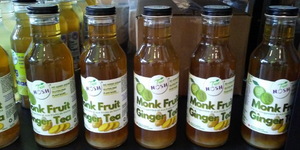Love tea?
Read on for some unbe-leaf-ably fascinating pro tips about this beverage!
1. Customize the variety
The diverse world of tea is terrific to explore! Green tea is linked to memory improvement, cancer prevention and reduction, and skin protection against sunburns (1,2,3,4). Having 4 cups of it daily for 2 months could significantly lower body weights and systolic blood pressures as well (5).
We can get even more specific: If you’re tackling something needing great attentiveness, drink caffeinated green tea—it can make you alert in just 10 minutes (6). And before tackling tasks requiring clear judgment, drink decaf green tea, which may help reduce inclinations to take (unnecessary) risks (7).
Other options are great, too. To feel less tired, drinking chamomile tea or lavender tea may help (8,9). Ginger tea—get this in our store!—can alleviate nausea, and matcha tea can help mitigate feelings of anxiety (10,11).
2. Avoid very hot tea
A study showed that drinking lots of tea (>700 mL a day) at or beyond 60°C can lead to 90% higher risks of developing esophageal cancer (compared to drinking less tea at lower temperatures) (12).
3. Go without ice
Adding ice can prevent the polyphenols (beneficial, protective compounds) in the drink from getting into your system—and put you at greater risk of developing kidney issues (13,14,15,16).
4. Pair with another drink
Drinking around or more than 4 cups of green tea is linked to a 40% lower risk of death for those living with diabetes—and, in addition to doing so, drinking 2 or more cups of coffee is reported to further bring that to 63% lower odds (17).
Or, how about something citrus? Enjoying lemon juice alongside your tea can keep 80% of the catechins in the tea—catechins have antioxidant properties and are involved in protecting cells (18,19).
5. Drink when timely
To optimize sleep quality, avoid drinking teas containing caffeine at least 6 hours before bedtime (20).
In addition, drinking tea reduces absorption of non-heme iron (the type of iron you get from plant sources and some meat sources) and may, over time, even lead to iron-deficiency anemia (21,22,23). So, having tea at least 1 hour after eating iron-containing foods is recommended (21). If you only eat plant-based diets, definitely try this tip to help make sure you get enough iron.
Explore these insights to get the most out of your next tea-drinking experience!
By Shawn Chang
References:
1. https://www.sciencedaily.com/releases/2004/10/041030144110.htm
2. https://www.sciencedaily.com/releases/2021/02/210212094113.htm
3. https://www.sciencedaily.com/releases/2015/05/150528145210.htm
4. https://pubmed.ncbi.nlm.nih.gov/34204433/
5. https://www.ncbi.nlm.nih.gov/pmc/articles/PMC3908530/
6. https://pubmed.ncbi.nlm.nih.gov/9784078/
7. https://pubmed.ncbi.nlm.nih.gov/35007234/
8. https://pubmed.ncbi.nlm.nih.gov/26483209/
9. https://pubmed.ncbi.nlm.nih.gov/26523950/
10. https://pubmed.ncbi.nlm.nih.gov/33867429/
11. https://www.sciencedaily.com/releases/2019/07/190709110228.htm
12. https://pubmed.ncbi.nlm.nih.gov/30891750/
13. https://www.ncbi.nlm.nih.gov/pmc/articles/PMC2848091/
14. https://www.ncbi.nlm.nih.gov/pmc/articles/PMC6160559/
15. https://www.sciencedaily.com/releases/2012/08/120802111332.htm
16. https://healthcare.utah.edu/healthfeed/postings/2015/04/042315_cvarticle-iced-tea-kidney.php
17. https://www.sciencedaily.com/releases/2020/10/201020190129.htm
18. https://www.sciencedaily.com/releases/2007/11/071113163016.htm
19. https://www.ncbi.nlm.nih.gov/pmc/articles/PMC6017297/
20. https://www.ncbi.nlm.nih.gov/pmc/articles/PMC3805807/
21. https://pubmed.ncbi.nlm.nih.gov/29046302/

